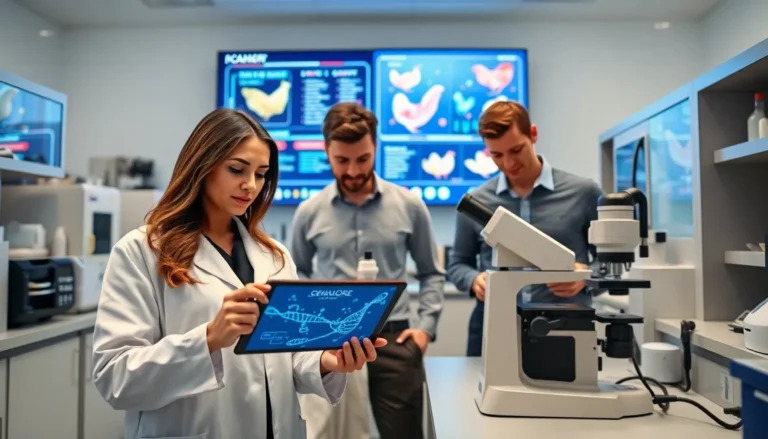The world of biotech pharmaceuticals is revolutionizing healthcare, offering innovative solutions to some of the toughest medical challenges. By harnessing the power of living organisms and biological systems, these cutting-edge therapies are transforming how diseases are treated and managed. From personalized medicine to advanced vaccines, biotech is paving the way for more effective and targeted treatments.
As the industry continues to evolve, it’s becoming increasingly important to understand the implications of these advancements. With a focus on research and development, biotech companies are not only improving patient outcomes but also driving economic growth. This article delves into the key trends, challenges, and future prospects within the biotech pharmaceutical landscape, shedding light on why this sector is crucial for the future of medicine.
Table of Contents
ToggleOverview of Biotech Pharmaceuticals
Biotech pharmaceuticals play a crucial role in advancing healthcare by utilizing biological systems and organisms to create innovative treatments. Their significance extends beyond mere medical applications, impacting various aspects of patient care and the overall healthcare landscape.
Definition and Importance
Biotech pharmaceuticals refer to medications developed using living organisms, biological processes, or derivatives of these entities. These products include monoclonal antibodies, recombinant proteins, and genetically engineered cells. Their importance lies in their ability to offer targeted therapies for complex diseases, such as cancer and autoimmune disorders. By addressing the underlying biological mechanisms, these pharmaceuticals enhance treatment efficacy and reduce side effects compared to traditional therapies.
Key Differences from Traditional Pharmaceuticals
Biotech pharmaceuticals differ from traditional pharmaceuticals in several ways:
- Source: Biotech drugs derive from living organisms, while traditional drugs typically come from chemical synthesis.
- Complexity: Biotech products are often biologically complex molecules, whereas traditional drugs are simpler, small-molecule compounds.
- Production: Biotech drugs require specific bioprocessing and purification methods, contrasting with the more straightforward manufacturing of traditional drugs.
- Regulatory Pathways: The approval process for biotech pharmaceuticals involves stricter regulatory oversight to ensure safety and efficacy due to their complex nature.
These differences contribute to the unique challenges and opportunities within the biotech pharmaceutical sector, ultimately enhancing the therapeutic landscape.
History of Biotech Pharmaceuticals

Biotech pharmaceuticals have evolved significantly since their inception, shaped by key milestones and regulatory changes. This history underscores the advancement of medical therapies derived from living organisms.
Milestones in Biotech Development
- 1973: First Genetic Engineering
Scientists Herbert Boyer and Stanley Cohen developed the first recombinant DNA technology, enabling the manipulation of genetic material. This breakthrough laid the foundation for modern biotechnology.
- 1982: First Biotech Drug
The approval of insulin produced by genetically engineered bacteria marked the launch of the first biotech pharmaceutical. This achievement demonstrated the potential of biotech in producing lifesaving medications.
- 1994: First Biologic Drug for Humans
The FDA approved Humulin, a genetically modified form of human insulin. This event set a precedent for future biologics and established safety and efficacy standards for biotech products.
- 2002: Genomics Era
The completion of the Human Genome Project provided extensive genetic information, accelerating the discovery of targeted therapies. This milestone enhanced the ability to develop personalized medicine.
- 2014: Breakthrough Therapy Designation
The FDA introduced this designation to expedite the development of drugs addressing serious conditions. This initiative fostered innovation and emphasized the importance of biotech therapies for complex diseases.
Impact of Regulatory Changes
Regulatory changes have significantly influenced the trajectory of biotech pharmaceuticals. They have established frameworks ensuring drug safety and efficacy while facilitating innovation.
- Early Regulations: Initial regulations primarily focused on safety and efficacy evaluations. Regulatory bodies like the FDA began defining standards for biologics and emphasized quality control.
- Biologics Control Act of 1902: This act laid foundational requirements for biological product licensing, ensuring consumer safety. It aimed to prevent contamination and ensure purity in vaccine production.
- Orphan Drug Act of 1983: This legislation incentivized the development of treatments for rare diseases by providing tax credits and market exclusivity. This act promoted interest in biotech pharmaceuticals targeting underserved conditions.
- Patents and Intellectual Property: Strong intellectual property frameworks have encouraged biotech investments. Patents protect innovative therapies, stimulating research and development across the industry.
- Fast-Track Processes: Regulatory bodies now implement expedited approval processes for drugs addressing critical health issues. These initiatives support swift access to groundbreaking therapies, improving patient outcomes.
Through these milestones and regulatory developments, biotech pharmaceuticals have become pivotal in transforming healthcare, continually shaping the landscape of modern medicine.
Current Trends in Biotech Pharmaceuticals
Biotech pharmaceuticals experience rapid evolution through innovative practices and technologies. Current trends highlight significant advancements in research and development alongside the emergence of cutting-edge technologies.
Advances in Research and Development
Biotech companies prioritize personalized medicine to tailor therapies for individual patients. Clinical trials increasingly focus on targeted treatments that engage specific biological pathways in diseases. For instance, CAR-T cell therapy shows remarkable efficacy in treating certain cancers by modifying patients’ T cells to attack tumor cells. Regulatory agencies are expediting approvals of breakthrough therapies, enhancing the pace of innovation. The integration of artificial intelligence (AI) in drug discovery streamlines the identification of potential drug candidates, significantly reducing timeframes from years to months.
Emerging Technologies
Gene editing technologies, such as CRISPR-Cas9, transform the development of therapies for genetic disorders. Techniques like gene therapy enable the correction of mutations at the DNA level, providing new hope for conditions once deemed incurable. Advancements in bioinformatics facilitate better data management and analysis, leading to improved understanding of disease mechanisms. Additionally, platform technologies enable rapid scalability of therapeutics, allowing for swift responses to emerging health crises. The rise of digital health applications captures real-time patient data, enhancing the monitoring of treatment efficacy and safety.
These trends shape the future of biotech pharmaceuticals, driving significant advancements in effectiveness and accessibility of healthcare solutions.
Challenges Facing Biotech Pharmaceuticals
Biotech pharmaceuticals encounter several challenges that can impact their development and commercialization. These challenges include regulatory hurdles and market accessibility issues, both of which play critical roles in the success of biotech products.
Regulatory Hurdles
Biotech pharmaceuticals face stringent regulatory requirements due to their complex nature and biological sources. Regulatory bodies, such as the FDA, enforce guidelines to ensure drug safety and efficacy, which can lead to lengthy approval processes. The intricate manufacturing processes of biologics also require extensive documentation and validation, adding to the development timeline.
Approval pathways for new biotech therapies often involve multiple phases of clinical trials, which can be resource-intensive and costly. The need for comprehensive data on product consistency, safety, and efficacy before market entry further complicates the regulatory landscape. Additionally, frequent changes in regulatory policies may hamper innovation, as companies must adapt their strategies to remain compliant.
Market Accessibility Issues
Market accessibility poses a significant challenge for biotech pharmaceuticals, impacting their reach and affordability. High production costs associated with developing and manufacturing biologics often translate to elevated pricing for end consumers. This high cost can limit patient access, particularly in low-income or uninsured populations.
Reimbursement models and healthcare policies vary widely across regions, affecting market entry strategies for biotech firms. Payers often require extensive clinical data demonstrating the cost-effectiveness of new therapies, which can delay the approval of insurance coverage. Furthermore, competition with traditional pharmaceuticals for market share adds pressure on biotech companies to innovate continually while managing costs.
Establishing partnerships with healthcare providers and navigating complex distribution networks also pose challenges in ensuring that these groundbreaking therapies reach the patients who need them.
The Future of Biotech Pharmaceuticals
The future of biotech pharmaceuticals presents promising advancements facilitated by continuous innovation and strategic growth. The sector is poised to influence global health significantly.
Predictions for Growth and Innovation
Growth in biotech pharmaceuticals is projected to accelerate, driven by advancements in technology and increasing investment in research. The global biotech market is expected to reach approximately $775 billion by 2024, with a compound annual growth rate (CAGR) of around 8% from 2020 to 2024. Innovations in gene therapies, such as CRISPR applications and biologic drugs, highlight this trajectory. Increased collaboration between biotech companies and academic institutions fosters groundbreaking research initiatives, enhancing the development of novel therapies. Furthermore, artificial intelligence and machine learning will streamline drug discovery processes, reducing development timelines and costs.
Potential Impact on Global Health
Biotech pharmaceuticals are likely to transform global health by offering solutions to prevalent diseases and improving access to medical care. Enhanced therapeutic options may decrease mortality rates in chronic conditions such as cancer and diabetes. Biologics will provide tailored treatments that address individual patient needs, improving overall health outcomes. Additionally, biotech innovations in vaccine development could expedite responses to emerging infectious diseases, as observed during the COVID-19 pandemic. Expanding access to these innovative therapies will likely bridge healthcare gaps in underserved populations, fostering global health equity.
Biotech pharmaceuticals are reshaping the landscape of healthcare with their innovative approaches to treatment. As advancements continue to emerge, the potential for personalized medicine and targeted therapies grows, offering hope for patients with complex diseases.
Despite facing challenges such as regulatory hurdles and high production costs, the sector is poised for significant growth. With a projected market value of $775 billion by 2024, the future looks bright for biotech pharmaceuticals.
Through ongoing research and collaboration, these therapies are set to enhance patient outcomes and promote health equity. The impact of biotech on global health is undeniable, paving the way for a new era in medicine.










